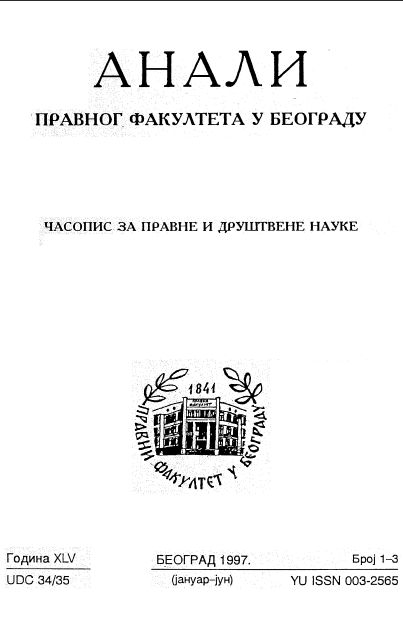ЈЕВРЕЈСКИ И РИМСКИ РОБОВИ ПРЕМА ФЛАВИЈЕВОМ ЈУДЕЈСКОМ РАТУ
JEWISH AND ROMAN SLAVES ACCORDING TO JOSEPHUS FLAVIUS’ JUDEAN WAR
Author(s): Jelena DanilovićSubject(s): History of Law, Jewish Thought and Philosophy
Published by: Правни факултет Универзитета у Београду
Keywords: Slaves; Wars; Prisoners-of-War; Patron Relations; Jewish Views on Slavery; Releasing Slaves from Bondage
Summary/Abstract: From the abundance of information the statesman, military commander and writer, Josephus Flavius provides on the Roman conquest of Judea in the first century A.D., we single out and examine in this paper what he recorded about slaves. The aim was to check and study what is generally known about slavery in the age of Antiquity, with the details given by Flavius. The first part of this work deals with the slaves owned by Jews, regardless of their ethnic origin and how they came to be slaves. Like everywhere else in the ancient world, the slaves who lived in the palaces of rulers and noblemen (familia urbana) enjoyed a better position. Educated slaves, who had the confidence of their masters, were entrusted with various assignments and missions, even with organising conspiracies. The slave-women in palaces worked at the weaving loom or produced other handiwork, and were also selected as concubines. Their price was sometimes high. Details as to how slaves were obtained are very scarce. The soldiers taken prisoner in battle did not always become slaves, but captured Romans were immediately put to death, if they did not commit suicide. It was the rule that a Jew could never be the slave of another Jew. In the Roman empire, the word slave was also used for people who had the status of peregrini. In this way, Eleazar, the defender of the Fortress of Massada, called on the people and the army, to commit suicide collectively before the Romans overran the fortress, and in his speech described their earlier status as peregrini, as “harmless slavery”. On the other hand, examples are mentioned in which slaves and freemen demonstrated great devotion and love for their masters. However, a master also had the right to inflict severe punishment on his slaves, which Flavius considered to be his natural right. According to “patriarchal laws” a military commander was forbidden to surrender to the enemy, among other things, so as not to become a Roman slave. The second part of the paper deals with Roman slaves who originated from Judea. There is less data about this with even fewer specific details. A more thorough description exists about the fate of the population of Jerusalem after Vespasian captured the city. Otherwise, Flavius also mentions, but also of the terrible fate of the Jews, after Jerusalem was finally taken. Lastly, law historians, for instance, may find an interesting example in the manner in which Vespasian liberated Josephus Flavius from slavery, after the latter had spent two years in captivity, chained in a prison. His chains were severed with an axe, which symbolised that he had been granted the status of a freeman. Little is known about freemen, but such data speaks of the great confidence their patron showed to them. The best known freeman, of course, was Josephus Flavius himself, who become a peaceful Roman citizen, dedicated to writing the history of the Jewish people.
Journal: Анали Правног факултета у Београду
- Issue Year: 45/1997
- Issue No: 1-3
- Page Range: 94-109
- Page Count: 16
- Language: Serbian

